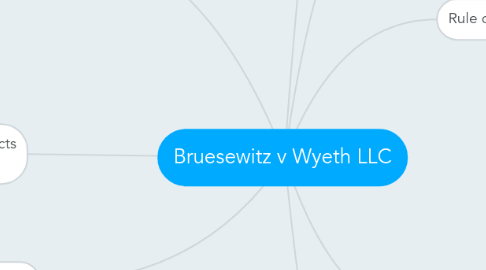
1. Impact of Decision
1.1. The case was important because it showed that vaccine manufactures could not be held liable for side effects from vaccines in reference to unexpected, unavoidable.
2. Why its important and how it affects business
2.1. This case is important because it clarifies unexpected and unavoidable side effects and that vaccine manufacturers have to be responsible for not common side effects that users experience. This protected vaccine manufacturers from mass exiting the vaccine manufacturing process. It affects business by showing that liability of products can have unexpected and unavoidable side effects that the manufacturer is not responsible for.
3. Two Current Business Practices
3.1. § 1103. Vaccines; mass-immunization exception
3.1.1. Created expectations when it comes to warning individuals involved in mass vaccination programs and what the manufacture is required to do.
3.2. DENYING THE OBVIOUS: WHY THE SPECIAL MASTERS SHOULD HAVE FOUND FOR PETITIONERS IN THE AUTISM OMNIBUS TEST CASES
3.2.1. This discussed whether individuals that were autistic could go after vaccine manufacturers because the measles vaccine could led to autism.
3.2.1.1. This would have bankrupt the NVICP
3.2.1.2. By ruling in favor it would have potentially cause parents not to vaccinate their children
3.2.1.2.1. Public Policy
3.2.1.2.2. Justice
4. Facts
4.1. Parties
4.1.1. Russell Bruesewitz, et al
4.1.2. Wyeth, Inc, fka Wyeth Laboratories, et al
4.2. What Happened
4.2.1. Hannah Bruesewitz received her six month diphtheria, tetanus and pertussis vaccine
4.2.1.1. Medical issues began
4.2.1.1.1. Started developing seizures
4.2.1.1.2. Suffered from Residual seizure disorder
4.2.2. Petition filed
4.2.2.1. One month prior seizure disorder removed from the list of compensable injuries.
4.2.2.1.1. Petition Denied
4.2.3. Wyeth withdrew vaccine used in Hannah's case. (1998)
5. Issue before the court
5.1. Are vaccine manufacturers reliable for product liability lawsuits filed in state courts seeking for damages caused by the administration of a vaccine.
6. Rule of Law
6.1. National Childhood Vaccine Injury Act
6.1.1. Program established to protect vaccine manufacturers from lawsuits over vaccine injury claims
7. Conclusion
7.1. Affirmed the lower courts decision. A special program exists to prevent manufacturers from leaving the vaccine market
8. Application
8.1. Vaccines are utilized to protect others
8.1.1. Children are recommended to receive certain vaccinations during growth and development
8.1.1.1. There are side effects to vaccines
8.1.1.1.1. Very limited number of side effects that have major and life changing effects
8.1.2. There are required vaccinations
8.1.2.1. Good for the mass public
8.1.2.2. Prevention of life changing diseases
8.2. Liability issues falls on who
8.2.1. Consumer believes the manufacturer is responsible for the horrible side effects
8.2.1.1. By having them choose a license they were treating large wineries (all out of the state) with discrimination
8.2.2. Manufacturer is protected by National Childhood vaccine Injury Act
8.2.2.1. "no-fault" compensation program exists
8.3. FDA Approved
8.3.1. This drug was approved by the FDA and met certain requirements.
8.3.2. FDA has the ability to revoke license if warranted but this case did not warrant it.
8.4. Wyeth Inc. is taxed
8.4.1. Funding goes to pay for "no-fault" compensation program
8.5. Bruesewitz lost case in state court but was awarded attorney fees and costs
8.5.1. They rejected the decision

